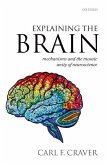We appear to think about the world by means of the same mechanisms that we use to experience it. Yet, abstract concepts like 'democracy,' 'fermion,' 'piety,' 'truth,' and 'zero' represent a clear challenge to this idea. In Abstract Concepts and the Embodied Mind, Guy Dove contends that abstract concepts are heterogeneous and pose three important challenges to embodied cognition. They force us to ask: How do we generalize beyond the specifics of our experience? How do we think about things that we do not experience directly? How do we adapt our thoughts to specific contexts and tasks? He further argues that a successful theory of grounding must embrace multimodal representations, hierarchical architecture, and linguistic scaffolding.
Bitte wählen Sie Ihr Anliegen aus.
Rechnungen
Retourenschein anfordern
Bestellstatus
Storno








